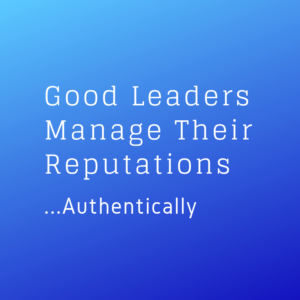 When contemplating alternative solutions to a problem or reactions to a situation, I frequently find myself giving this advice “what story do you want told about it or about you?” Reputations are yours and yours alone – to make, to keep and to manage. Yet, so often we give them up without much thought to the long-term impact that it might have.
When contemplating alternative solutions to a problem or reactions to a situation, I frequently find myself giving this advice “what story do you want told about it or about you?” Reputations are yours and yours alone – to make, to keep and to manage. Yet, so often we give them up without much thought to the long-term impact that it might have.
In today’s politics, (or any era really), the complaint about politicians is that they say whatever the audience wants to hear. They are often pandering, catering or speaking to their audiences believing it will in some way help them in the future. The reality is that most humans are pretty good at sniffing out inauthenticity and that becomes the reputation of that politician. Saying what people want to hear might feel right in the moment, but if it’s not true or you don’t believe it, you just created your reputation. Think about it, one negative action or impression has the ability to wipe out every previous good act before it. The debacle in Virginia politics right now is case in point. No one remembers what the three officials did or did not do before the various scandals hit. Now it’s all about the scandals and the way each have reacted to it. It supersedes anything else they may or may not have done. It becomes their permanent reputation.
Authentic reputations are not made by “spin.” Spin is just another way of saying alternative facts, which of course there is no such thing. There are opinions, interpretations, and beliefs about the facts, but facts remain facts. Good reputations are made by consistent, straightforward and trustworthy behavior. Does this person have a track record of behaving this way? Can they be trusted?
Early on in my career, I did and said things that although seemed funny or appropriate at the time built a reputation that I’m not sure I even thought about. Fortunately, I had someone ask me if that’s the story I wanted to tell? Somewhat ashamed, I had to admit it was not. From that point on, I was careful to only say what I really meant and what was consistent with my story. It’s not about how it looks, it’s about you and your story. Who are you and what do you stand for? Reputations are memorable for those moments when we stand up for our values regardless of who is looking. And those moments when we act in opposition to our values will cause us to create an unintentional reputation.
One of Marshall Goldsmith’s “Leadership Habits” that he calls “behavioral tics,” is the “excessive need to be me.” Although you certainly have every right to “be you,” as a leader if you are not considering the impact on others, you may be creating a reputation that you will come to regret.
Remember it takes a lifetime of consistent, authentic behavior to create a good leadership reputation. It will be lost in that one moment of haste or hubris. Don’t let your reputation be hijacked by your own carelessness or someone else. It’s your story to tell.
